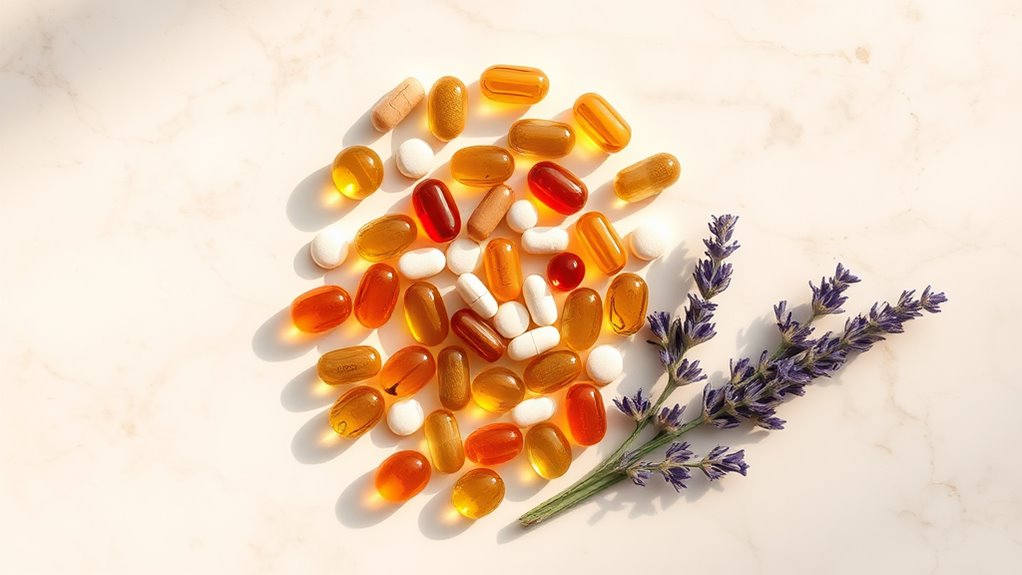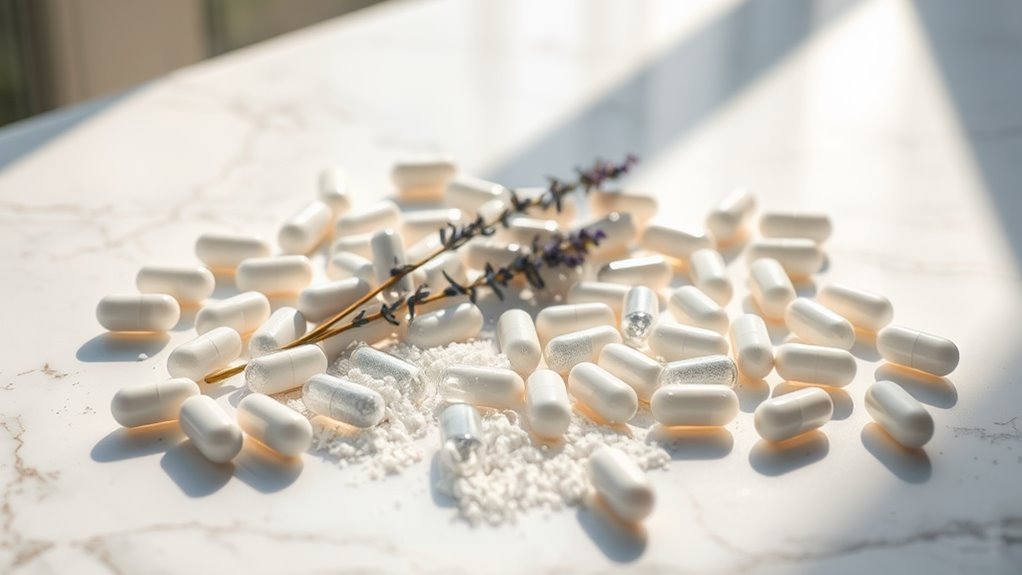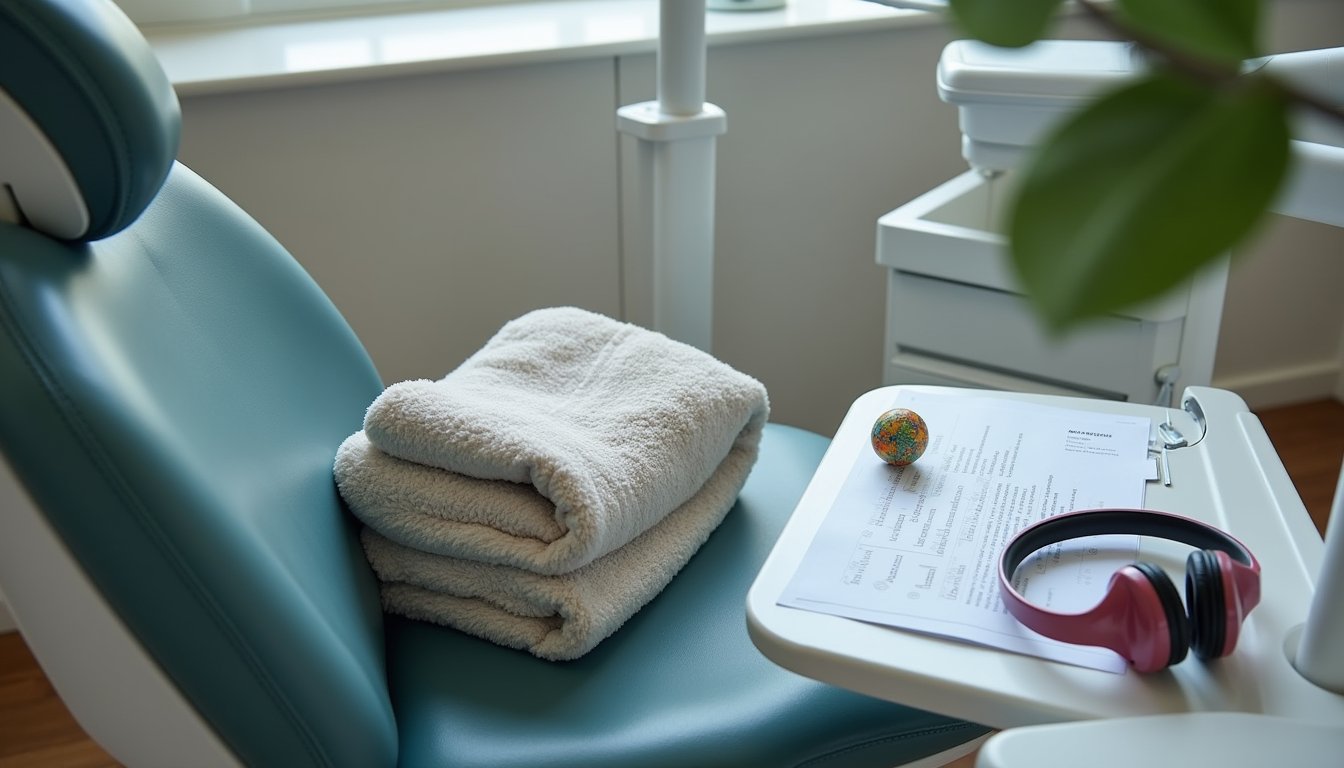Five science-backed nutrients can effectively combat your stress and anxiety. Vitamin B complex supports neurotransmitter regulation, while vitamin D reduces anxiety symptoms at doses of 1600mg daily. Magnesium regulates cortisol and GABA levels, with glycinate forms showing superior absorption. Ashwagandha demonstrates significant anxiety reduction at 240-1250mg daily, and omega-3s provide extra mood support at 2000mg. Understanding the proper dosages and combinations of these supplements will enhance your stress-management results.
The Science Behind Vitamin B Complex and Stress Reduction

While stress affects nearly everyone, research has shown that vitamin B complex plays an essential role in managing our body’s stress response. These eight essential vitamins work together as coenzymes to support your nervous system and regulate vital neurotransmitters like serotonin and dopamine. Plant-based foods support comprehensive nutrient intake and provide complete B vitamin nourishment.
Clinical studies demonstrate that B vitamin sources, including whole grains, legumes, and vegetables, can greatly reduce work-related stress and improve cognitive performance. When you’re deficient in B vitamins, you may experience increased anxiety and depression symptoms. This is because B vitamins, particularly B6, B9, and B12, help regulate homocysteine levels linked to stress and mood disorders. Research confirms that high-dose B vitamin supplementation over 90 days can effectively lower stress levels and improve mental well-being, with combined B vitamins showing greater benefits than individual supplements. Studies have found that natural vitamin B sources offer superior benefits in reducing oxidative stress compared to synthetic supplements.
Understanding Vitamin D’s Role in Anxiety Management
As research continues to uncover the complex relationship between nutrition and mental health, vitamin D emerges as a crucial player in anxiety management. Studies consistently show a strong inverse anxiety correlation, where higher vitamin D levels typically correspond with reduced anxiety symptoms. Specifically, adults with the highest vitamin D levels demonstrate lower odds of anxiety. Clinical studies have shown that doses of 1600 mg daily can improve anxiety symptoms over a six-month period.
Your body’s vitamin D status affects both immune and nervous system functions, with research highlighting its neuroprotective and immunomodulatory properties. You’ll find vitamin D receptors in key brain areas like the prefrontal cortex, suggesting direct involvement in anxiety regulation. Through its interaction with gut microbiota and ability to promote redox balance, vitamin D helps maintain ideal neurological health.
Clinical evidence indicates that higher doses of vitamin D supplementation may effectively reduce anxiety symptoms, though individual responses can vary based on factors like seasonal changes and existing health conditions.
Magnesium: Your Natural Stress-Fighting Mineral

With regard to managing stress and anxiety naturally, magnesium stands out as one of nature’s most effective mineral solutions. This essential mineral regulates cortisol levels and balances neurotransmitters like GABA, helping to calm your body’s fight-or-flight response. Research shows that magnesium deficiency can greatly increase stress levels and anxiety symptoms. Studies indicate that magnesium’s ability to mimic anxiety medications may provide relief for some individuals. Multiple scientific reviews from 2010 to 2017 have demonstrated that magnesium reduces anxiety across various forms of the condition.
You’ll find several effective forms of magnesium supplements, with magnesium glycinate and threonate being particularly beneficial for anxiety relief due to their superior absorption rates. The recommended daily intake ranges from 310-420mg, though you can also enhance your levels through magnesium-rich foods like leafy greens, legumes, and nuts. Before starting any magnesium supplements, consult your healthcare provider, as excessive intake can cause adverse effects like diarrhea and muscle weakness.
Ashwagandha: An Ancient Herb for Modern Stress Relief
For thousands of years, ashwagandha has stood as a cornerstone of Ayurvedic medicine, earning modern scientific validation for its powerful stress-reducing properties. This adaptogenic herb’s traditional usage has centered on enhancing well-being and resilience to stress. The name itself translates to smell of horse, reflecting its reputation for promoting strength and vitality.
Clinical studies confirm ashwagandha’s benefits through its interaction with your body’s stress response system. It works by moderating cortisol levels via the hypothalamic-pituitary-adrenal (HPA) axis, while potentially influencing serotonin and other mood-regulating neurotransmitters. A recent double-blind, placebo-controlled study demonstrated significant improvements in anxiety scores among stressed adults. Research shows significant reductions in anxiety scores and stress levels when taking 300-600mg daily of standardized extract.
You’ll find ashwagandha particularly effective at doses between 240-1,250mg per day, with clinical trials demonstrating improved sleep quality and psychological well-being. The herb’s excellent safety profile makes it a reliable choice for natural stress management.
Essential Supplements and Lifestyle Changes for Optimal Results

While managing stress requires an all-encompassing approach, combining targeted supplements with lifestyle modifications can greatly boost your resilience to daily stressors. Start with essential vitamins like D3 and B-complex, particularly B3 and B2, which have shown significant anxiety-reducing properties. You’ll also benefit from incorporating omega-3 fatty acids, aiming for 2000mg daily through fish or supplements. Approximately half of Americans lack sufficient magnesium, which is crucial for managing anxiety and sleep issues. Studies show that low caffeine tea provides more effective stress reduction benefits than regular tea due to optimal L-theanine absorption.
Beyond herbal remedies and dietary adjustments, focus on complementary lifestyle changes. Regular exercise, consistent sleep patterns, and mindfulness practices improve supplement effectiveness. Consider adding proven stress-fighters like L-theanine or magnesium glycinate to your regimen. For sleep support, melatonin offers a safe, non-addictive option that doubles as an antioxidant. Remember to consult your healthcare provider before starting any new supplement routine, especially if you’re taking medications.
Frequently Asked Questions
Can Stress-Fighting Vitamins Interact Negatively With Antidepressant Medications?
Like mixing oil and water, vitamin supplements and antidepressants don’t always blend well together. You’ll need to be especially careful with vitamin interactions when taking antidepressants, as some combinations can cause dangerous effects. Supplements like St. John’s Wort, 5-HTP, and SAMe can interfere with medication safety by either increasing serotonin to dangerous levels or reducing your antidepressant’s effectiveness. Always consult your healthcare provider before combining any supplements with your prescribed medications.
How Long Does It Typically Take to See Results From Stress-Relief Supplements?
You’ll typically notice stress relief timeline varies by supplement type. Ashwagandha generally takes 2-4 weeks, while magnesium may show effects within days. B vitamins can improve mood within a few weeks, but omega-3s might require several months for ideal supplement effectiveness. Your individual response depends on factors like dosage, consistency, and metabolism. For best results, you’ll need to take supplements regularly and monitor your progress through mood tracking.
Are There Any Vitamins That Should Not Be Taken Before Bedtime?
Just as drinking coffee before bed can keep you wired, certain vitamins can act like tiny alarm clocks in your system. When considering vitamin timing, you’ll want to avoid B12, B-complex vitamins, and vitamin D before bedtime as they can disrupt your sleep patterns. These nutrients energize your body, similar to a morning cup of coffee. Take these vitamins in the morning instead, and save sleep-friendly nutrients like magnesium for your evening routine.
Which Vitamins Are Most Effective for Panic Attacks Versus General Anxiety?
For panic attacks specifically, you’ll find magnesium glycinate and vitamin B12 most effective, as they directly target the nervous system’s acute responses. B12 helps manage physical symptoms, while magnesium glycinate regulates overactive neurotransmitters during panic episodes. For general anxiety vitamins, vitamin B6 and vitamin D work best long-term, reducing total neural excitation and anxiety symptoms. They’re most effective when combined with other B vitamins as part of your daily routine.
Do Stress-Fighting Supplements Need to Be Taken With Food for Optimal Absorption?
In terms of hitting the nail on the head with supplement timing, you’ll want to take most stress-fighting supplements with food. Fat-soluble vitamins (A, D, E, K) and omega-3s need dietary fats for ideal absorption, while B vitamins and magnesium are better absorbed with meals. However, absorption factors vary ashwagandha can be taken on an empty stomach, though eating may reduce potential stomach discomfort. You’ll enhance benefits by timing supplements with your meals.
















